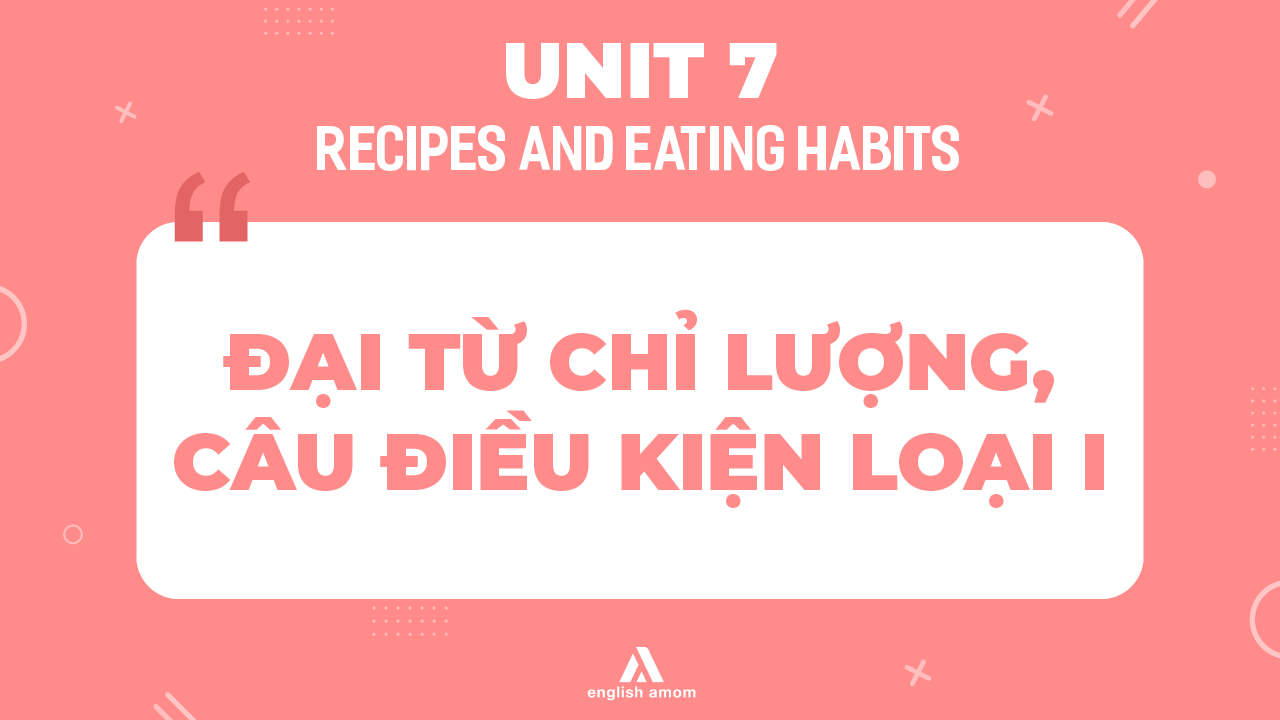
► Kênh hỏi đáp và giải thích thắc mắc kiến thức MIỄN PHÍ → truy cập LINK NHÓM: ENGLISH AMOM
► Kênh YOUTUBE hệ thống toàn bộ bài giảng CLIPS: truy cập LINK: ENGLISH AMOM CHANNEL
► Kênh TIKTOK: ENGLISH AMOM
I. LÝ THUYẾT
A) ĐẠI TỪ CHỈ LƯỢNG
1) Cách dùng của a, an, some, any
Xem lại lý thuyết về cách dùng của các đại từ chỉ lượng và làm các bài tập thực hành: Tại đây
2) Từ định lượng cho đồ ăn
| a teaspoon of ( 1 thìa trà nhỏ) | a bag of ( 1 túi ) | a pinch of ( 1 nhúm ) | a handful of ( 1 nắm ) |
| a tablespoon of ( 1 thìa súp đầy) | a carton of ( 1 hộp ) | a stick of ( 1 thanh, 1 cây) | a slice of ( 1 lát ) |
| a cup of ( 1 cốc ) | a tin of ( 1 lon, 1 hộp ) | a bunch of ( 1 bó, 1 chùm, 1 nải) | a loaf of ( 1 ổ ) |
| a bottle of ( 1 chai ) | 100 grams of ( 1 lạng ) | a head of ( 1 cây ) | a clove of ( 1 nhánh) |
B) CÂU ĐIỀU KIỆN LOẠI I VỚI ĐỘNG TỪ KHUYẾT THIẾU
► Cấu trúc cơ bản: If S + V(hiện tại đơn), S + will + V-infi
Thay vì will, chúng ta có thể sử dụng những động từ khuyết thiếu khác như: can, must, may, might hoặc should ở mệnh đề chính để chỉ khả năng, lời khuyên, sự có thể xảy ra, sự cần thiết.
► Cấu trúc biến thể: If S + V(hiện tại đơn), S + can/ may/ might/ must/ should + V-infi
Ex: 1. If you cut your finger, it will bleed.
2. If you finish your dinner, you can watch TV. (permission – sự cho phép)
3. If he likes eating spicy food, he may/might add chilli. (possibility – khả năng)
4. If you feel unwell, you shouldn't eat fast food. (advice – lời khuyên)
II. BÀI TẬP
2) Match the food quantifiers with the nouns. Some quantifiers can go with more than one noun ( Page 11)
|
a. milk b. garlic c. celery d. cabbage e. salami f. beef g. sugar h. grapes |
1. a teaspoon of 2. a bottle of 3. 300 grams of 4. a stick of 5. a bunch of 6. a head of 7. a slice of 8. a clove of |
ĐÁP ÁN
|
1. a, g |
2. a |
3. f, g |
4. c |
|
5. h |
6. b, d |
7. e, f |
8. b |
6) What will you say in these situations? Use suitable modal verbs with conditional sentences type 1 ( Page 12)
1. Your father likes salty food, but you think it is necessary to reduce the amount of salt in his food. Otherwise, his health will suffer. You share your opinion with him.
2. Your brother is a good eater. He's able to eat three bowls of rice when he's hungry. You tell this to your friend.
3. You want to take a cooking class. Your mum agrees but asks you to choose a class at the weekend. Here is what she says to you.
4. Your friend offers you a slice of pork, but you see that it is undercooked. You refuse because it is possible that you will have a stomachache. You tell this to her.
5. Your sister is making a cake. You advise her to whisk the eggs for 10 minutes so that the cake is lighter.
ĐÁP ÁN
1. If you want to have good health, you must reduce the amount of salt in your food.
2. If my brother is hungry, he can eat three bowls of rice.
3. You can take a cooking class if it is at the weekend.
4. If I eat this undercooked pork, I may have a stomachache.
5. You should whisk the eggs for 10 minutes if you want a lighter cake.

